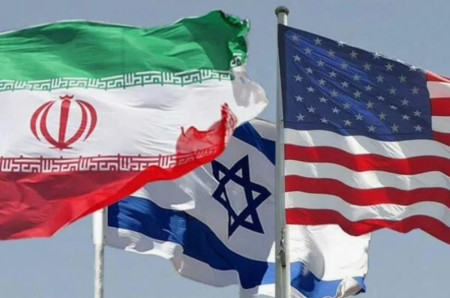
American news outlets are seeking to convince the world that their President Joe Biden is acting as a peacemaker in the ongoing conflict between Israel and Iran, in a bid to prevent an outbreak of unpredictable war in the Middle East. They write he has allegedly persuaded Prime Minister Benjamin Netanyahu not to bomb Iranian nuclear program enterprises and energy facilities in retaliation. But who would believe that?
Leaders of the Jewish state have been hatching plans for a crushing blow to Iran for over 40 years, and now that the international context is the best way to facilitate this, abandoning the obsession to finish the enemy off once and for all means condemning Israel to a longer and tougher confrontation with its outcome unknown. And in Israel, all the society strata do apprehend this and endorse their government.
It seems a safe bet that the United States has given Israel a thumbs-up to conduct an operation against Iran. Everything else, including the Pentagon's announced transfer of a THAAD battery to Israel to ostensibly strengthen its air defense, should be regarded as an act of disinformation and concealment of genuine allied intentions. Under the guise of placing the battery, which doesn't make much difference in boosting Israel's security, the Americans will supply the Jews with something much more efficient. Not defensive but offensive, mind you. Perhaps a high-power rocket-powered weapon.
It should be appreciated that key facilities of Iran's nuclear program are scattered over the country's entire territory. The Israelis will therefore need lots of supplies -- missiles and guided glide bombs. It’s number one. Number two, most of these manufacturing sites are located in remote desert and mountainous areas, built underground at a depth of 8 to 80 meters.
Israel has a significant arsenal of bunker-busting air-delivered and rocket ammunition, whose targeting is carried out using space means the Jews do not possess. There is a good chance that under the guise of deploying an American air defense battery, a special communications and electronic control center will be located in Israel to guide ammunition by applying the GPS system.
Israel's task performance is technically complicated. While earlier it had hoped to reach agreements with a number of Arab countries on the use of their airspace for Israeli warplane flights, now this has become an issue. Amid the Iranian threat, the governments in the United Arab Emirates, Saudi Arabia and Qatar have announced an official ban on Israeli sorties over their territories.
Another problem is the critically needed mid-air refueling for Israeli fighters. Of course, the most effective things may be flights over Iraq as it has no cutting-edge air defenses: Tel Aviv is not even going to ask permission from the Iraqi government, acting under the cover of Americans stationed at two local air bases and having tanker planes at their disposal there.
The third challenge is Russians in neighboring Syria. No prize for guessing that electronic means deployed at the Russian bases of Tartus and Khmeimim monitor activities of all the Israeli military air bases, accurately fixing the number and types of aircraft taking off from them. Moreover, Russian electronic warfare systems are capable of jamming aviation guidance and control systems. Quite naturally, any Israeli fighter takeoff is recorded and immediately reported to Tehran, given its relations with Moscow. No doubt about it.
On Tuesday, October 15, a Gulfstream G550 signal-intelligence aircraft with no identification or registration marks was noticed at Russia’s Domodedovo Airport, the Tsargrad Telegram channel reports. Given the presence of a container in its underbelly, it might have been Israel’s Shavit with a powerful radar and a closed communication system. The guests must have been primed to urgently solve some vital strategic issues while not ringing any alarm bells, Russian military expert Vladislav Shurygin believes.
The East is tricky, indeed. Especially now, when the Middle East has found itself on the verge of a major war, and the thin threads of peace may give it up and break. But it is where a curious question arises as to what is the essence of Israeli message to the Russians? Making sure that they won’t interfere? Or let them in on their plans?
Presumably, the situation will clear up in the coming days already. But one true thing is that Tehran should not have delayed the signing of its Comprehensive Strategic Cooperation Agreement with Moscow. If the document were in operation now, things would have developed under a different scenario.
Arguments that Israel will not destroy the nuclear component of Iran's economy are misguided.


